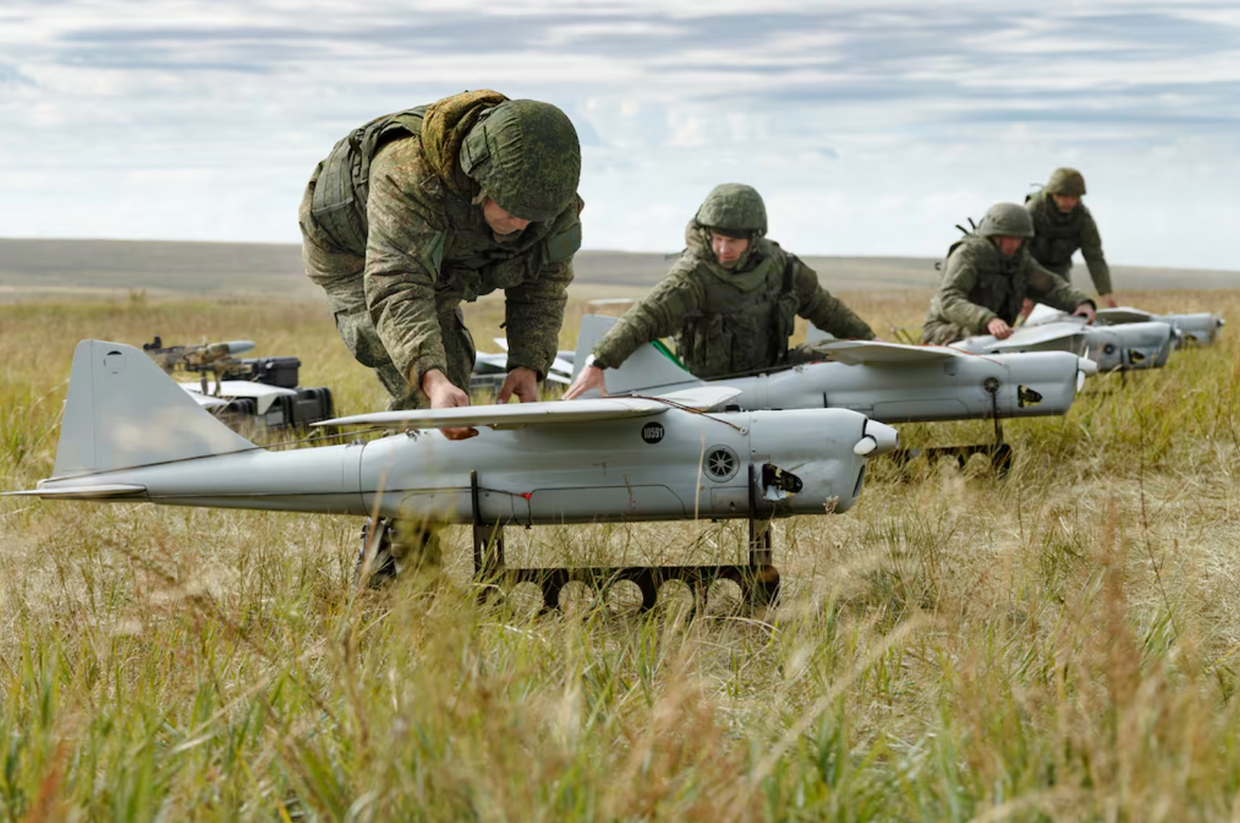Opinion: Canceled Ramstein meeting marks a missed opportunity for Europe to lead on Ukraine
The cancellation of the Ramstein conference reveals Europe's inability to seize a critical opportunity to assert leadership in supporting Ukraine.

German Chancellor Olaf Scholz (2nd R) gestures as he speaks with (L-R) U.K. Prime Minister Keir Starmer, U.S. President Joe Biden, and French President Emmanuel Macron in Berlin, Germany, on Oct. 18, 2024. (John Macdougall/POOL/AFP via Getty Images)
A short trip to Germany instead of the planned state visit. A four-way meeting in the Chancellery instead of the conference in Ramstein to coordinate future aid for Ukraine with some 50 participating states, including numerous heads of state and government. With Hurricane Milton in Florida preventing U.S. President Joe Biden from adhering to his planned itinerary, the entire European political scene was thrown off course.
There is no other way to describe the events of the last 14 days. Worse yet, what happened — or, more accurately, what didn’t happen — in Germany exemplifies the desolate state of European foreign and security policy at a critical moment.
Why did the Ramstein conference have to be canceled? Was it only because the American president couldn’t be there? Were the Europeans not strong enough to host a conference without the participation of the American president, or, if necessary, with the U.S. Secretary of State or Secretary of Defense present?
The just-completed German-United Kingdom defense pact suggests that where there is a will, action can be taken. But Europe needs more than such narrowly tailored bilateral agreements, no matter how positive they can be.
The reason is abundantly clear: Ukraine is desperately waiting for more help. The third winter of the war Russian President Vladimir Putin launched in February 2022 is just around the corner, and the country’s situation is getting worse by the week.
That Ukraine will get “all the help it needs, and it will get it for as long as it needs it,” has been the routine refrain heard in most European capitals, especially from the German government, for two and a half years. But this claim is simply wrong, no matter how many times it is repeated.
The history of aid to Ukraine is a history of constant dithering and hesitation, of stalling and tactics. When nothing else helps, the American president is called upon to break the political logjam.

But Biden spent much of this year, before his withdrawal from the presidential race, on the campaign trail. Now he is on a farewell tour. A new president will be elected on Nov. 5, and if his name is Donald Trump, there will be no slipstream for the Europeans to hide in. The canceled Ramstein conference would have been the perfect opportunity for Europe to at long last take the lead.
" The canceled Ramstein conference would have been the perfect opportunity for Europe to at long last take the lead."
German Chancellor Olaf Scholz should have shown what the "Zeitenwende" (“turning point”) which Scholz declared following Russia’s invasion means for Europe as a whole. Together with France and Great Britain, he should have made clear statements to Putin: If you did not end your war of terror against Ukraine’s civilian population within 24 hours, they could have said, the range limits on the weapons being supplied to Ukraine will be lifted.
If that were not enough, it could have been added that Germany would supply Taurus cruise missiles to Ukraine to help destroy the Russian army’s supply routes into the country. France and Great Britain are already supplying cruise missiles with the range needed to hit the Russian army’s supply lines and are apparently prepared to go down this path.
Fear and the desperate hope of being able to portray himself as a “peace chancellor” shortly before Germany’s federal election next year have become Scholz’s dominant motives. But “fear is the mother of all cruelty,” as Michel de Montaigne, the sixteenth-century French philosopher, put it. French President Emmanuel Macron has no doubt read Montaigne and understands that warning.
Instead of acting decisively at Ramstein, Scholz had a nice coffee with Biden, shortly before the U.S. president was awarded the special level of the Order of Merit of the Federal Republic of Germany. But that award ceremony was a moment that united Great Britain, France, Germany, and the U.S. merely in nostalgia, not in defining the decisive action and sense of purpose which Europe needs today.
Indeed, the ceremony recalled nothing so much as how Germany’s government behaved in the years before the fall of the Berlin Wall and reunification, before the division of Europe was overcome, before the war in Ukraine. The old Europe of the Cold War sought comfort in the past and confidence in the solitary U.S. leadership that defined the era. Europeans forging their own decisions were rarely even an afterthought back then. For example, did no one even think of inviting Polish Prime Minister Donald Tusk to the meeting in Berlin?
Biden’s flight back to Washington following the aborted Ramstein conference and the diminished meeting in Berlin’s Chancellery may take on an almost symbolic significance in the future: the last Atlanticist U.S. president for a long time bidding farewell to Europe. And the Europeans, without leadership and without the slightest idea of what lies ahead, waving goodbye to him, dreamily reminiscing about earlier times.
Editor’s Note: The opinions expressed in the op-ed section are those of the authors and do not purport to reflect the views of the Kyiv Independent.










